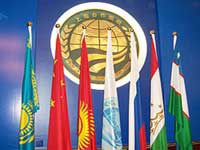SCO: Vehicle For China, Russia To Defend Themselves Against West

Monday, the leaders of the Shanghai Cooperation Organization (SCO) countries met in St. Petersburg. Some Western media have been caustic in appraising the organization. The SCO boasts two big powers, China and Russia, and four central Asian countries as members, and now has several major Asian countries as observers. Others are lining up for membership. While facing complex external pressures, cooperation within the SCO is progressing apace.
China holds the absolute economic advantage in the SCO, but Russia is ahead of China in several other aspects. SCO holds practical functions for China, such as anti-terrorism. It is also a platform to extend the Sino-Russian strategic partnership and acts as a stage for China to attune its broad diplomatic ability with its growing clout.
Internationally there is often discussion about who is the true leader of the SCO between China and Russia? At present, China is not capable of leading the SCO yet and should perhaps not have such ambitions.
It is not worthwhile for China to fight with Russia within the SCO. The two countries are both independent global powers and their relationship has a profound effect on the world stage. The strategic risks they face exist outside Asia. The SCO should be a place for China and Russia to come together and smooth over small differences.
Russia is a serious strategic partner for China. As long as this relationship is maintained, both countries will find it easier to assert themselves globally.
The West cannot threaten these countries individually, let alone united. Even if both countries value their relations with the West dearly, China and Russia are friends. It is one important reason why the West emphasizes and respects the two countries.
However, as the gap in economic strength between the two countries widens, Russia may make subtle changes in its attitude toward China. It is hard to say that the Sino-Russian relationship will remain as it is. As neighbors, the two play roles in each other’s development.
China should bind with Russia as much as possible through the SCO, rather than proving that it surpasses Russia in certain aspects. Its strategic aims within the SCO should remain modest and work to increase common interests.
China can be broad-minded, but its control of the SCO is limited. The organization may not always go where we wish it to. This is a reality China must accept.
The adjustment of the global forum politic is being largely influenced by China’s rise.
Therefore, developing a sense of laissez-faire should become a crucial component of China’s political and diplomatic strategies.

